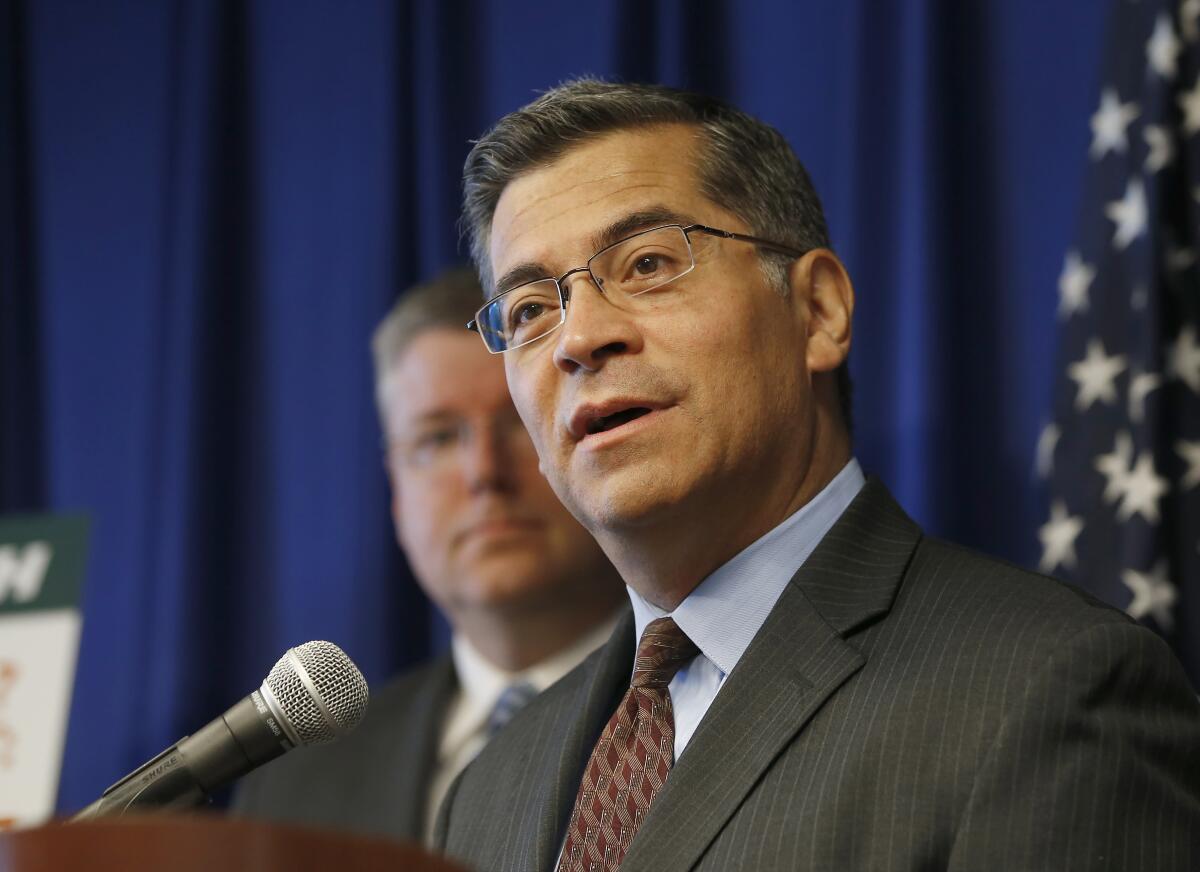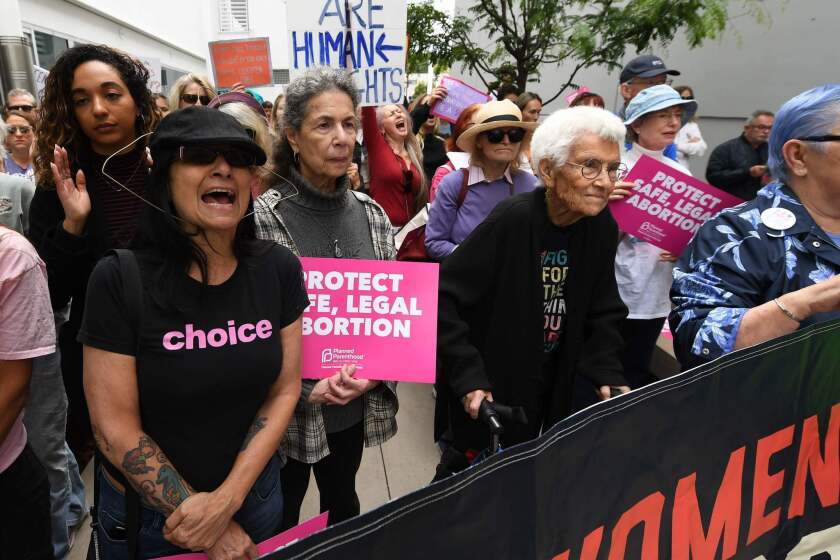Column: California blocks a hospital merger amid concerns about religious limits on care

California Atty. Gen. Xavier Becerra has blocked a proposed merger of two sectarian hospital chains in Northern California, asserting that the deal had the”potential to increase health costs, and potentially limits access and availability of healthcare services.”
The merger would have brought together four Catholic hospitals operated by St. Joseph Health System and five hospitals owned by Adventist Health, which is affiliated with the Seventh-day Adventist Church. Both religious groups place restrictions on healthcare, particularly in the areas of reproductive health and gender identification.
Although Becerra didn’t refer explicitly to the religious limits on the hospitals’ services in his announcement Thursday rejecting the merger, those limits were among the concerns cited by consumer groups that filed objections to the deal, such as Health Access California and the ACLU of Northern California. No hospitals were to be shuttered after the merger, suggesting that Becerra’s reference to “access and availability” of healthcare turned on religious strictures.
Religious freedom is important, but it should not be used to impose on other peoples’ healthcare and harm them.
— Phyllida Burlingame, ACLU of Northern California
The ruling recognizes “the threat that’s posed to Californians’ health when these entities that make decisions based on religious doctrine rather than patients’ needs are growing and consolidating in our state,” said Phyllida Burlingame, director of reproductive justice and gender equity at the ACLU of Northern California.
“Both Adventist Health and St. Joseph Health are very disappointed in the outcome of this decision,” Adventist Health said in statement. “At this time, our organizations will need to take a step back and determine implications of this decision.”
The spread of religious restrictions on healthcare has increasingly become an issue as Catholic hospitals enter into affiliations with nonsectarian institutions or others that don’t share their doctrinal rules. Catholic hospitals now account for roughly 1 in 6 U.S. hospital beds. Earlier this year, those concerns torpedoed a proposed affiliation between Dignity Health, a Catholic chain, and UC San Francisco Medical Center. Many professionals at UCSF, as well as some UC regents, objected to UCSF professionals and patients becoming subject to Catholic healthcare restrictions.
“Religious freedom is important,” Burlingame told me, “but it should not be used to impose on other peoples’ healthcare and harm them.”
The University of California regents are wrestling with a question that should have an easy answer: Should they approve an “affiliation” between UC San Francisco, one of the leading teaching hospitals in America, and Dignity Health, a Catholic hospital chain that openly discriminates against women and LGBTQ patients and requires its doctors to comply with religious directives, some of which run counter to medical science and ethical practice?
Becerra has also been concerned with the tendency of hospital mergers to drive up healthcare costs in the affected markets. In a lawsuit last year, he accused the giant hospital chain Sutter Health of price fixing in the Northern California markets it dominates. The lawsuit was recently settled, on terms that remain undisclosed, just before trial was scheduled to start in San Francisco state court.
The four hospitals owned by St. Joseph Health — Queen of the Valley Medical Center in Napa, Santa Rosa Memorial Hospital, St. Joseph Hospital of Eureka and Redwood Memorial Hospital of Fortuna — are all governed by the Ethical and Religious Directives for Catholic Health Care Services.
Under state law, Becerra has a say in the transfer of any not-for-profit hospital in the state. Earlier this year, he tried to block the sale of two hospitals owned by bankrupt Verity Health System to Santa Clara County, where they are located, unless sale conditions imposed by his predecessor, Kamala Harris, remained in place. The conditions included mandates for job preservation and charity care. A federal bankruptcy judge rejected Becerra’s conditions and approved the sale in April.
Verity had been a long-struggling chain; before the bankruptcy, the hospitals and four other Verity facilities had been managed by a firm controlled by Dr. Patrick Soon-Shiong, owner of The Times, but the firm had been unable to turn them around.
The document, a product of the U.S. Conference of Catholic Bishops, bars virtually all abortions, in vitro fertilization, the distribution of contraceptives, assisted suicide and gender-affirming care such as hormone treatments and surgeries for transgender patients, among other treatments.
A California appeals court rejects a church effort to eliminate abortion from its insurance coverage
The Adventist guidelines are less restrictive, but the church regards abortion for birth control as “not morally acceptable” and frowns on LGBTQ relationships. Church doctrine states that it “strongly cautions transgender people against sex reassignment surgery and against marriage, if they have undergone such a procedure.”
The ACLU, in its formal comments on the proposed merger, said that “if the provision of healthcare is to be guided by such statements, it casts serious doubt on an institution’s ability to treat a transgender patient without bias and as a whole, integrated person.” The Adventist hospitals in the merger are located in Ukiah, Willits, St. Helena, Clear Lake and Vallejo.
Although the two systems told Becerra that each would retain its religious character after the merger, there was reason to question whether the Adventist hospitals would see Catholic rules become their practices over time. The latest edition of the Catholic directives, issued in 2018, warns against affiliations in which the Catholic institution or its employees even “assist” or “make referrals” for “immoral procedures” such as abortions.
An appeals court reinstates a lawsuit against Dignity Health for denying surgery to a transgender patient.
In 2013, physicians at Hoag Memorial Hospital in Newport Beach were barred from performing abortions after Hoag became affiliated with St. Joseph Health. Hoag, a Presbyterian-affiliated institution, had never placed restrictions on the procedure before then.
The post-merger plans of Adventist and St. Joseph called for the closing of the obstetrics and behavioral health units at Adventist’s St. Helena hospital and replacing them with facilities for emergency services, cardiology, cardiac surgery, oncology and orthopedics.
As Health Access California observed in its comments on the proposal, obstetrics services would be relocated to St. Joseph’s Queen of the Valley hospital in Napa, which is 20 miles away and subject to the Catholic restrictions on reproductive care. Those restrictions would prevent sterilization services such as tubal ligations from being performed at the time of delivery, when the procedure is safest and most efficient.
“Some of those served at Queen of the Valley would be forced to travel even further to receive perinatal/obstetrical care which is often time sensitive,” Health Access noted.
More to Read
Inside the business of entertainment
The Wide Shot brings you news, analysis and insights on everything from streaming wars to production — and what it all means for the future.
You may occasionally receive promotional content from the Los Angeles Times.













